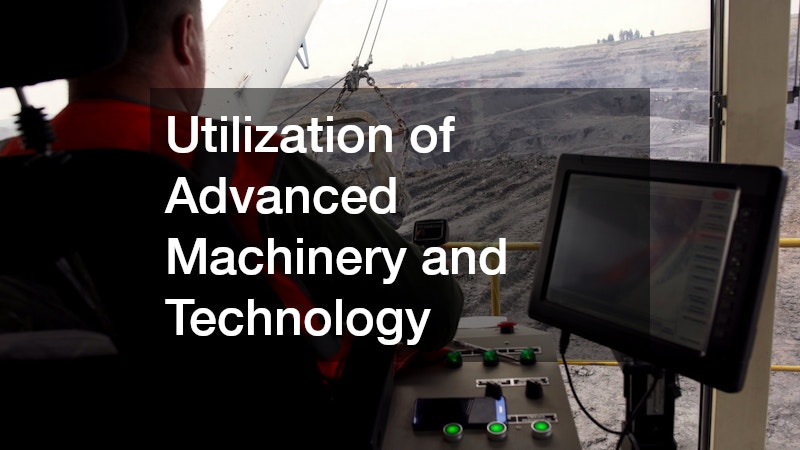Excavation is a pivotal stage in the construction process, serving as the foundation on which the success of a project rests. By meticulously preparing construction sites, excavating companies ensure that everything is set for safe and effective building operations. This article delves into how these companies handle site preparation, prioritize safety, and use modern technologies to deliver the best results.
Initial Steps Taken by Excavating Companies Before Construction Begins
Site Assessment and Surveying
The process begins with a thorough site assessment, where experts examine the land’s physical and geological characteristics. This survey considers soil type, topography, and any existing structures to determine the most suitable methods for excavation. Once the assessment is complete, the company teams with governing bodies to acquire necessary permits, ensuring compliance with local regulations.
Environmental considerations play a central role, with companies evaluating potential impacts on nearby ecosystems and planning to mitigate harm. For instance, excavating companies must plan for any wildlife habitats or protected species that may be affected. This careful analysis helps in preserving local biodiversity while preparing the site for future construction activities.
Acquiring permits involves navigating bureaucratic challenges, aligning construction plans with zoning laws and ensuring sustainable practices. The permits cover areas such as noise control, waste management, and erosion control measures. These steps help avert legal setbacks, keeping projects on track and within budget.
Utility and Obstruction Identification
Before any ground is broken, it’s crucial to identify underground utilities such as water, gas lines, and electrical cables. Excavating companies often collaborate with utility providers to obtain blueprints and conduct ground-penetrating radar scans. This proactive approach minimizes the risk of accidents, safeguarding both workers and assets.
Beyond utilities, companies must recognize and address natural or man-made obstructions that could hinder operations. These might include large rock formations, old construction remnants, or underground water channels. How these obstacles are handled can drastically influence the project timeline and budget, making early identification and planning essential.
By addressing potential barriers upfront, excavating companies can devise effective strategies to either incorporate them into the site plan or remove them altogether. This ensures that the construction proceeds without costly interruptions. Ultimately, these careful preparations contribute to a smoother, more predictable project execution.
How Excavating Companies Ensure Safety on the Site
Implementing Safety Protocols
Safety is the backbone of any successful construction project, starting with comprehensive training for all site employees. Excavating companies enforce stringent safety protocols to protect workers and the general public during operations. Regular equipment checks and maintenance form an integral part of these measures, ensuring every tool and machine is in optimum condition.
Education and training modules often cover equipment handling, emergency procedures, and site-specific risks. By instilling a culture of safety, companies aim to reduce accidents and create a secure working environment. Additionally, safety supervisors are usually appointed to oversee adherence to protocols, rectify hazards, and offer real-time guidance.
Managing Environmental Impact
Addressing environmental concerns is vital to sustainable construction practices, and excavating companies are committed to minimizing ecological footprints. Environmental protocols include erosion control methods like silt fences and sediment basins that prevent soil displacement during site preparation. By maintaining natural ground covers and incorporating temporary stabilization techniques, companies reduce environmental degradation.
Waste management is another focus area, ensuring responsible disposal and recycling of construction debris. Through strategic planning, companies segregate recyclable materials and hazardous waste, collaborating with licensed disposal entities. Such disciplined waste management not only aligns with legal duties but also exhibits social responsibility.
Techniques and Technologies Excavating Companies Use for Efficient Operations
Modern Excavation Techniques
Today’s excavation practices have evolved to include innovative techniques that enhance efficiency and precision on-site. Traditional methods like trenching and grading are now complemented by advanced practices such as hydro-excavation and directional drilling. Each technique is chosen based on specific project requirements, soil conditions, and environmental considerations.
The choice of technique impacts the excavation timeline and budget, with modern methods often allowing for quicker completion while maintaining quality. For instance, trenching remains a staple for projects involving pipe or cable installations due to its ability to create uniform, narrow channels. Site leveling, another indispensable technique, ensures a stable foundation for future structures, highlighting the pivotal role of precision in construction success.
Utilization of Advanced Machinery and Technology
The integration of advanced machinery and technology has revolutionized excavation practices, elevating efficiency levels. Heavy machinery like excavators, bulldozers, and loaders are standard equipment for excavation projects, designed to handle various site challenges. These machines are often outfitted with the latest technologies, such as GPS and automated controls, for enhanced precision.
Excavating companies also harness technology such as drones and three-dimensional mapping tools to capture detailed site data. This data facilitates more accurate project planning and progress tracking, aiding in timely decision-making. Moreover, these technologies are instrumental in minimizing human error, thus reducing overall project risks.
Excavating companies are integral to the success of construction projects, laying the groundwork for safety and efficiency from the outset. By employing rigorous planning, advanced technology, and a steadfast commitment to safety, these companies ensure that sites are primed for construction. As the industry continues to evolve, the role of excavation remains a cornerstone, testament to its importance in shaping the modern built environment.



